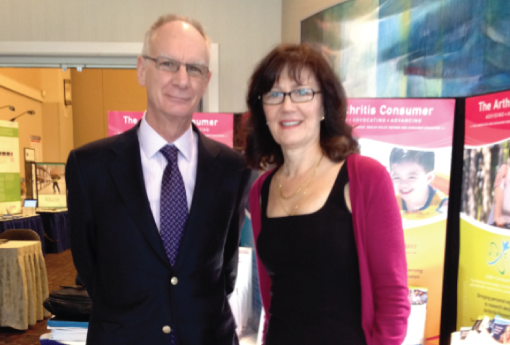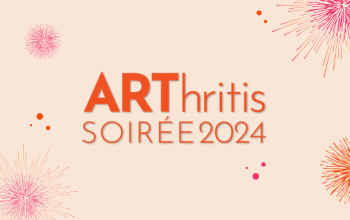The Arthritis Newsletter
Spring 2016How an Engaged Patient Informs Research and Develops New Routes for Knowledge Translation
By Sheila Kerr
Nadia Prestley has been a key Arthritis Patient Advisory Board (APAB) volunteer for many years. She has nurtured the understanding of what it is like to live with rheumatoid arthritis through her partnerships with researchers and research staff. She has openly shared her knowledge and experiences about living with this chronic disease.
Nadia, why did you get involved with APAB?
At first, I was hesitant about getting involved but my daughter, who was working at Arthritis Research Canada (ARC) at the time, said: “Wouldn’t you love to be working with people who understand the challenges you face and who are supporting research that can make life easier for people with arthritis?” To better make her point, she invited me to attend the Reaching Out with Arthritis Research (ROAR) public forum. ROAR is an annual event coordinated by patient volunteers, where ARC researchers explain their research findings to the public in plain language. I was blown away – so much valuable information!
You were involved in various research studies at ARC, and worked with a few of the researchers. How was that experience?
Yes, I had the privilege of working with Catherine Backman, Diane Lacaille, Linda Li and Allen Lehman. Initially, I was a bit intimidated because I didn’t know if I had anything to offer. It quickly became evident that my fears were unfounded. I learned that the researchers make the patients feel comfortable – they truly want to hear the patients’ personal experiences and welcome their feedback. I came to understand that they are committed to finding solutions to OUR challenges, and who best to identify those challenges than the arthritis patient.
Can you tell us about your experience participating in research projects, for example, MAKING IT WORK?
Making it Work is an educational program designed to help people with inflammatory arthritis stay employed for as long as they can. I had to leave my place of employment because of my arthritis, so you can imagine how excited I was to learn that they were creating a tool that would allow people with arthritis to stay employed. Rates of work disability for people with rheumatoid arthritis are high, so a program designed to help these people stay employed is crucial – not just for the individual with arthritis but also the family. When a family loses the income from one of the principal providers, it can have devastating consequences for every member of that family.
Did you participate in the research project, ANSWER?
Yes, ANSWER, a decision aid for methotrexate, was also an exciting study. We patients have advocated becoming part of the treatment decision-making process. However, there are times when we just don’t have enough information to make those decisions, or we simply don’t feel confident making them. We need these tools to help us realize the options available, and the benefits and risks of different treatments; only then will we be able to make a decision that is best for us. I wish this tool had been available to me when I was considering methotrexate. I understand an ANSWER tool for biologics is also being developed – terrific news!
Were you able to choose the projects?
APAB provides flexibility for their members. There are so many options available. I could either choose to attend meetings to discuss research priorities, participate in surveys, participate in research studies, help with event planning, write articles for the newsletter, or edit lay summaries. A bonus was that many of these options allowed me to work from the comfort of my home, and I could work only when I was able to do so.
What have you learned that you can share with future volunteers?
I learned the significance of the arthritis patient’s perspective! Patient involvement plays a vital role in improving the quality of arthritis research and ensuring that it is relevant to our [arthritis patients’] needs.
On the other hand, I learned that the benefits flowed both ways; the researchers benefit from having us involved and patients also benefit a great deal. We interact with people who are empathetic to our plight and want to learn more about life with arthritis. We develop an increased understanding of our disease and are able to utilize our skills in an effort to improve patient quality of life. This aspect alone has proved to be very empowering to those of us who have lost so much because of this disease.
Which initiatives would you like to be remembered for and why?
Creating The Arthritis Newsletter and The Lifestyles Management Guide because both provide support, encouragement and inspiration to the arthritis patient. The newsletter, in particular, was so much fun because it allowed me to work with senior APAB members who made invaluable contributions. I would not have been able to see my vision realized had it not been for their tremendous support and commitment. Camaraderie among members is strong and we are always willing to assist each other when needed.
Anything else you’d like to say to people with arthritis who may have considered getting involved in a research study?
You have something to contribute!!! And, you don’t have to become an APAB member to contribute to research. Check out ARC’s website and seek out your research participation options. It can be as easy as testing a program and giving your feedback. Your voice needs to be heard – your participation is key to moving research projects forward so that we can all benefit!
Is there anything else you feel signifcant to share?
To APAB members, ARC researchers and ARC research staff: THANK YOU! When I was first diagnosed with arthritis, I was afraid and felt very alone. I needn’t have been, for what I didn’t know was that you are all working tirelessly to find the answers to improving our lives for the better!
To people with arthritis: Feel confident in the fact that there are those who understand our plight, and will find solutions – we are definitely not alone!
APAB and ARC researchers and staff would like to thank Nadia for her tremendous contributions over many years. She was instrumental in nurturing a culture of respect and partnership between the researchers and patients at ARC. Her shared experiences and organizational skills contributed to the foundation of many APAB projects. Nadia has been an active member since 2008 and is retiring from active participation this year. We wish Nadia all the best.


























































